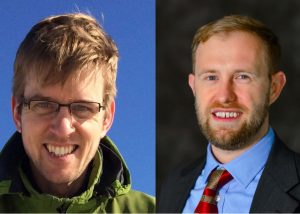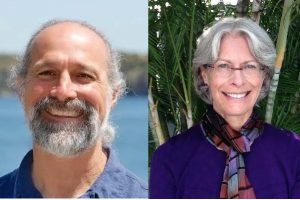Aeppli and Murphy Awarded National Academies’ Gulf Research Program Fellowships
– AUGUST 31, 2017
The Gulf of Mexico Research Initiative (GoMRI) congratulates Dr. Christoph Aeppli and Dr. David Murphy on receiving Early-Career Research Fellowships.
These competitive two-year fellowships recognize professionals at the critical pre-tenure phase of their careers for exceptional leadership, past performance, and potential for future contributions to improving oil system safety, human health and well-being, or environmental protection.
“I am very grateful for the Gulf Research Program Early Career fellowship,” said Aeppli. “I investigate formation, fate, and effect of oil transformation products, and there are significant knowledge gaps when it comes to characterizing their molecular composition or toxic effects. The results produced for my current GoMRI-funded project opened up important new avenues for my research. The fellowship will now allow me to follow through on these ideas, generate proof-of-concept data, and start new synergistic collaborations.” Aeppli explained that this fellowship will be critical to moving his research forward and that the mentoring will provide many insights into maintaining a thriving research portfolio.
“As a new professor, this Early Career Fellowship is going to be hugely helpful to me as I build my laboratory,” said Murphy. “It will enable me to hire another PhD student to focus on oil spill-related research and I’ll be able to buy some much-needed equipment as well.” Murphy plans to focus on some of the small-scale physical processes that can transfer tiny oily marine aerosol droplets to the atmosphere that nearby people can potentially inhale.
Biological oceanographer and zooplankton ecologist Dr. Kendra Daly, Murphy’s mentor at the University of South Florida’s College of Marine Sciences said, “David Murphy is an outstanding engineer who develops unique methods to better understand a range of interdisciplinary topics such as the impacts of small-scale ocean hydrodynamics on zooplankton behavior and the impacts of aerosolization of oil droplets at the air-sea boundary on human and marine mammal health.”
Coastal oceanographer and zooplankton ecologist Dr. David Fields, Aeppli’s mentor at the Bigelow Laboratory of Ocean Sciences said, “Christoph Aeppli is an environmental chemist with an interest in understanding the source, fate, and effects of organic compounds in coastal and open ocean environments. Since coming to Bigelow Laboratory, he has applied his tools toward linking the chemical composition of weathered oil to its toxicity. Among other things, he investigates acute and chronic toxic effects on copepods, a project where we collaborate.”
Murphy was a member of the Dispersion Research on Oil: Physics and Plankton Studies consortium from 2012 to 2016. He has published several peer-reviewed papers with GoMRI support, including how chemical dispersant affects oil plume behavior, trends and gaps in oil spill literature since 1968, and how raindrops push oil spill pollutants into air and below sea surface. The Screenscope film production company featured Murphy as part of a Dispatches from the Gulf documentary film that highlights GoMRI research.
Aeppli has been conducting GoMRI-funded oil spill research since 2011 and currently is a co-Principal Investigator of the project The State-of-the-Art Unraveling of the Biotic and Abiotic Chemical Evolution of Macondo Oil: 2010-2018. He has also been on research teams with the consortium Deepsea to Coast Connectivity in the Eastern Gulf of Mexico (DEEP-C) and the project Collection and Analysis of Oiled Sand Patties along the Gulf Coast. Aeppli has published 13 peer-reviewed papers with GoMRI support, including one that advanced predictions of air pollution from oil slick evaporation and another that extended precise analysis of oxygenated products in weathered oil. Other studies he co-authored informed oil spill forensics with petroleum biomarkers and uncovered a larger spectrum of fate for weathered oil.
Aeppli and Murphy represent the successful manifestation of a GoMRI Legacy Goal: building scientific and intellectual capacity for response and mitigation strategies for future oil spill events and by informing future scientists and engineers.
************
The Gulf of Mexico Research Initiative (GoMRI) is a 10-year independent research program established to study the effect, and the potential associated impact, of hydrocarbon releases on the environment and public health, as well as to develop improved spill mitigation, oil detection, characterization and remediation technologies. An independent and academic 20-member Research Board makes the funding and research direction decisions to ensure the intellectual quality, effectiveness and academic independence of the GoMRI research. All research data, findings and publications will be made publicly available. The program was established through a $500 million financial commitment from BP. For more information, visit https://gulfresearchinitiative.org/.
© Copyright 2010-2017 Gulf of Mexico Research Initiative (GoMRI) – All Rights Reserved. Redistribution is encouraged with acknowledgement to the Gulf of Mexico Research Initiative (GoMRI). Please credit images and/or videos as done in each article. Questions? Contact web-content editor Nilde “Maggie” Dannreuther, Northern Gulf Institute, Mississippi State University (maggied@ngi.msstate.edu).







